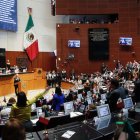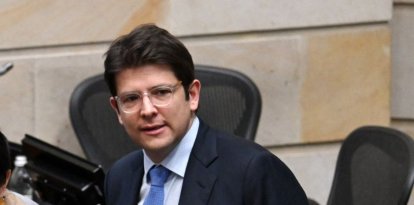Mexico's Judicial Elections: AMLO's poisoned legacy that includes candidates from Tinder and even a drug trafficking lawyer
For the first time in the history of the Aztec country, citizens will be able to go to the polls to elect more than 800 members of the Judiciary, although only 23% of the population is expected to do so.

Claudia Sheinbaum and AMLO in a file photo.
Mexico will elect for the first time in its history hundreds of judges, magistrates and ministers who make up its Judicial Branch. The election, scheduled for this Sunday, June 1, has been criticized for benefiting pro-government candidates, opening the door to lawyers defending drug traffickers or not contemplating other necessary legislative changes in the country.
In total, more than 4,000 candidates were approved by the authorities to participate in the most anti-popular process in recent years in the Aztec country. For the election the Instituto Nacional Electoral (INE), the main electoral authority in charge of organizing the elections in Mexico, will install tens of thousands of polling stations around the country, with a budget 10 times lower than expected, and a strategy that no one has been able to defend.
The election will be held despite warnings and warnings from experts and participating candidates of unfairness in the race and possible interference by political parties and powerful cartels in favor of candidates aligned with their interests.

World
Election of judges in Mexico: this is how the independence of the Judiciary could be extinguished
Emmanuel Alejandro Rondón
Judicial Elections: Lopez-Obrador's controversial legacy
The election is the product of a controversial reform approved in September 2024 in Mexico, and which according to critics represents an attempt by the ruling National Regeneration Movement (Morena) party to take over one of the branches of the State.
However, its main promoter, former president Andrés Manuel López Obrador—who approved it a month before leaving office—, and his successor, Claudia Sheinbaum, have defended the initiative by arguing that its objective is to cleanse the Judicial Branch of corruption.
Before and after the reform, experts and international organizations warned that the election of judges puts at risk the independence of the judicial system in a nation with impunity levels hovering around 99%.
Half of the judges will be elected now and the other half in 2027.
The new system, which eliminates another 1990 reform, is based on popular vote and reduces the requirements of experience and minimum age, allowing nominations even without a judicial record.
">🇲🇽 | ÚLTIMA HORA
— UHN Plus (@UHN_Plus) September 10, 2024
Reforma al Poder Judicial en México: manifestantes ingresaron al Senado y los legisladores suspendieron el debate.
Los manifestantes a la iniciativa de reforma constitucional entraron al recinto legislativo al grito de: “El Poder Judicial no va a caer, no va a… pic.twitter.com/SyaQ9OHiR7
Giant ballots, thousands of candidates and an electoral labyrinth
Mexican voters will choose 881 federal positions: the nine seats of the renewed Supreme Court, two of the Superior Chamber of the Electoral Tribunal of the Federal Judiciary (TEPJF), 15 regional chambers of the TEPJF, the five members of the new Tribunal of Judicial Discipline, 464 court magistrates and 386 judgeships.
For this, there are a total of 3,422 nominations: 64 for the SCJN, 38 for the Judicial Tribunal, 15 for the Superior Chamber of the TEPJF, 96 for the regional chambers of the Electoral Tribunal, 1,640 for magistrates and 1,570 for courts.
The complexity
Within some ballots another color code is also added, depending on the subject matter of those judges: civil, criminal, administrative.
In addition, to the six federal ballots, ballots for local elections will be added in 19 States. The INE has calculated that each person will take between eight and 14 minutes to vote.
"This is the main challenge facing the judicial election: citizens have serious obstacles to be able to locate the candidates, compare the offers and above all have access to the information required to choose in the best conditions," says UNAM researcher Josafat Cortez, who points out that this has led the aspirants to a judicial position to be placed by their "color and number" rather than by their professional trajectory.
What do the polls say?
A poll commissioned by EL PAÍS and W Radio to Enkoll reveals that 77% of Mexicans have not even heard mention of the candidates running. Only 18% consider that they are very informed on this issue, while 43% responded with a timid "somewhat informed" on the subject.
The same survey, carried out between the 18th and 20th of this month, reveals the lack of citizen knowledge that still persists about the call to vote: 86% know about the call to vote, but only half (48%) can cite the exact date of the elections, June 1. Nevertheless, 38% say they will go to the polls, although a 22.9% probable turnout is expected.
As for the possible winners, especially for the SCJN positions, the polls do not align and all give different results on the preference of society. Paid polls? Could be.
Among the neutral initiatives to get voters to the polls, there have been from the call of the president in the last few days, to the announcement by FEMSA that it will offer free coffee in its Oxxo self-service stores to those who vote this Sunday.
In Mexico, unlike other countries in the region, voting is not compulsory.

World
Mexico finally approves its controversial judicial reform that attacks separation of powers
Juan Carlos Téllez
The profiles of the candidates: a campaign that reaches Tinder, goes through TikTok and includes more than 80 candidates who have been identified by the justice system.
The final list of Aztec candidates, including some who were selected by a raffle, is made up of thousands of profiles that have sought to stand out through creative campaigns, in the best of cases, although the majority of the population is unaware of them.
Local markets were visited by Supreme Court aspirants with megaphone in hand. On networks such as X or TikTok, others appeared dancing. There was even a candidate courting voters on Tinder.
In a pun-filled video bragging about his qualifications, one candidate claims to be "more prepared than a chicharron" (a pork fry), leading him to go viral as the "Chicharron Minister" on the internet. Another called itself "Dora la Transformadora", in reference to the Nickelodeon character, but also alluding to AMLO's legacy, defined as the 4T, or "Fourth Transformation."
But more worryingly, Mexico's historic judicial election has been marred by accusations of candidacies with possible links to drug-trafficking criminal organizers, sex offenders or members of politico-religious sects, such as the Light of the World.
Silvia Rocío Delgado García, a lawyer who was part of the legal defense of Joaquín 'El Chapo' Guzmán, is seeking to become a criminal judge in the judicial district that includes Ciudad Juárez. Her candidacy has generated attention due to her participation as a lawyer for the former Sinaloa Cartel leader following his capture in January 2016.
This is not an isolated case. The platform Defensorxs, founded by lawyer Miguel Alfonso Meza, has reported a hundred similar cases, all contrasted with documentation accompanying the complaint.
In the judicial election there are also candidates linked to organized crime, murders, forced disappearances, bribes, kidnappings and other irregularities, according to the public platform.
More than 80 "highly risky" candidacies
Fernando Escamilla Villareal was arrested in 2016 for carrying a firearm without a license, and is linked to the legal defense of Miguel Angel Treviño Morales, known as Z-40, leader of the Zetas cartel, sent to the United States days ago along with 28 other drug traffickers. He was also a defender of other confessed criminals. Today he is a candidate for district judge of the fourth circuit specialized in the criminal system in Nuevo Leon.
Fernando Escamilla Villareal was arrested in 2016 for carrying a firearm without a license, and is linked to the legal defense of Miguel Angel Treviño Morales, known as Z-40, leader of the Zetas cartel, sent to the United States days ago along with 28 other narcos. He was also a defender of other confessed criminals. Today he is a candidate for district judge of the fourth circuit specialized in the criminal system in Nuevo Leon.
Another case denounced by the platform corresponds to Pablo Andrei Zamudio Diaz, who was arrested for extortion last year. He had also failed twice in the competitive examinations to become a judge, however, he is a candidate for magistrate of the first circuit of Mexico City in administrative matters.
Luis Castañeda Palacios is competing to become a District Judge (federal) in Labor matters in Mexico City, but the candidate has been denounced for acts of abuse and sexual harassment, as well as threats against 36 women. In addition, in 2022 he ran over a motorcyclist who lost his life.
Among the long list of women singled out is Elizabeth Guzman Vilchis. The candidate was arrested by the Attorney General's Office of the State of Mexico in 2025 for the alleged crime of extortion. In addition, she is one of the officials related to the disappearance and murder of Homero Gómez, the defender of the monarch butterfly. She is competing to become a Judge of First Instance in Accusatory and Oral Criminal Matters in Michoacán.
Bolivia, the background of a disaster
Bolivia has been directly electing its highest judicial authorities for more than a decade; however, justice in the Andean country is politicized and some consider the system a "complete disaster" at best, or an outright "failure." It is the only country on the continent—and in the world until June 1—using this model.
Since 2011, Bolivian citizens have gone to the polls to vote for the 28 positions in the Supreme Court of Justice, the Constitutional Court, the Agro-environmental Court and the Magistrates Council.
But the 2017 judicial elections, in which the null vote exceeded 50%, were a clear reflection of citizen disenchantment. The lack of confidence in the candidate selection process, the perception of politicization and the persistence of corruption undermined the legitimacy of the reform.
Evo Morales, the former president and current defendant in cases of rape and human trafficking, who promoted the reform, defended the process and attributed the high percentage of null votes to a boycott campaign by the opposition. However, the reality is that citizens expressed their dissatisfaction with a judicial system that continues to be slow, inefficient and at the service of political pressures.
The Bolivian experience reminds us that the path and system of electing judges by citizen vote could unleash a series of structural problems that would further complicate the health of justice in Mexico.

























